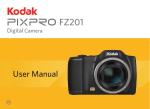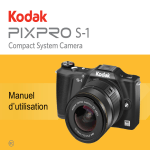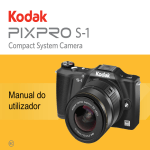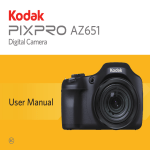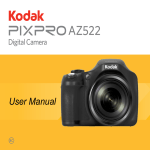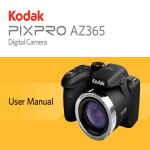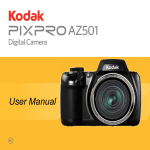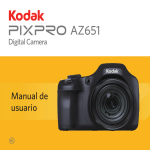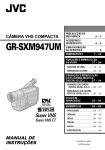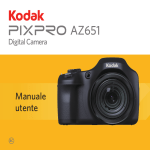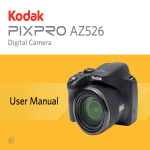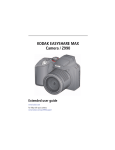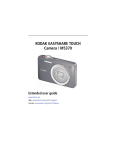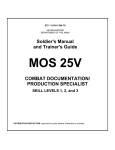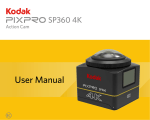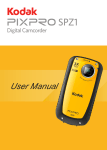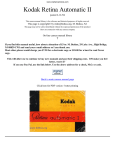Download User Manual - kodakpixpro.com
Transcript
User Manual 1 Before You Start Declaration of Conformity Responsible Party: JK Imaging Ltd. Address: J K Imaging Ltd., 17239 So. Main Street, Gardena, CA 90248 USA JK Imaging Europe, 71 Clarendon Road, Watford, WD17 1DS, UK Company Website: http://kodakpixpro.com INDUSTRY CANADA This device complies with Canadian RSS-210. This device complies with Industry Canada license-exempt RSS standard (s). Operation is subject to the following two conditions: (1) this device may not cause interference, and (2) this device must accept any interference, including interference that may cause undesired operation of the device. Radiation Exposure Statement: The product comply with the Canada portable RF exposure limit set forth for an uncontrolled environment and are safe for intended operation as described in this manual. The further RF exposure reduction can be achieved if the product can be kept as far as possible from the user body or set the device to lower output power if such function is available. 1 For Customers in Europe This symbol [crossed-out wheel bin WEEE Annex IV] indicates separate collection of electrical waste and electronic equipment in the European countries. Please do not throw the equipment into domestic refuse. Please use the return and collection systems available in your country for proper, safe disposal of this product. "CE" mark indicates that this product complies with the European requirements for safety, health, environment and customer protection. "CE" marked cameras are intended for sales in Europe. Europe – EU Declaration of Conformity This device complies with the essential requirements of the R&TTE Directive 1999/5/ EC. The following test methods have been applied in order to prove presumption of conformity with the essential requirements of the R&TTE Directive 1999/5/EC: - EN 60950-1: 2006+A11:2009 +A1:2010 +A12:2011 Safety of Information Technology Equipment - EN 62311: 2008/ Article 3(1) (a) and Article 2 2006/95/EC Assessment of electronic and electrical equipment related to human exposure restrictions for electromagnetic fields (0 Hz-300 GHz) (IEC 62311:2007 (Modified)) 2 - EN 300 328 V1.7.1: 2006 Electromagnetic compatibility and Radio spectrum Matters (ERM); Wideband Transmission systems; Data transmission equipment operating in the 2.4 GHz ISM band and using spread spectrum modulation techniques; Harmonized EN covering essential requirements under article 3.2 of the R&TTE Directive. - EN 301 489-1 V1.9.2: 2011 Electromagnetic compatibility and Radio Spectrum Matters (ERM); Electro Magnetic Compatibility (EMC) standard for radio equipment and services; Part 1: Common technical requirements. - EN 301 489-17 V2.2.1: 2012 Electromagnetic compatibility and Radio spectrum Matters (ERM); Electro Magnetic Compatibility (EMC) standard for radio equipment and services; Part 17: Specific conditions for 2.4 GHz wideband transmission systems and 5 GHz high performance RLAN equipment. For Customers in the U.S.A. Federal Communication Commission Interference Statement This device complies with Part 15 of the FCC Rules. Operation is subject to the following two conditions: (1) This device may not cause harmful interference, and (2) this device must accept any interference received, including interference that may cause undesired operation. 3 This equipment has been tested and found to comply with the limits for a Class B digital device, pursuant to Part 15 of the FCC Rules. These limits are designed to provide reasonable protection against harmful interference in a residential installation. This equipment generates, uses and can radiate radio frequency energy and, if not installed and used in accordance with the instructions, may cause harmful interference to radio communications. However, there is no guarantee that interference will not occur in a particular installation. If this equipment does cause harmful interference to radio or television reception, which can be determined by turning the equipment off and on, the user is encouraged to try to correct the interference by one of the following measures: - Reorient or relocate the receiving antenna. - Increase the separation between the equipment and receiver. - Connect the equipment into an outlet on a circuit different from that to which the receiver is connected. - Consult the dealer or an experienced radio/TV technician for help. FCC Caution: Any changes or modifications not expressly approved by the party responsible for compliance could void the user's authority to operate this equipment. This transmitter must not be co-located or operating in conjunction with any other antenna or transmitter. Radiation Exposure Statement: The product comply with the FCC portable RF exposure limit set forth for an uncontrolled environment and are safe for intended operation as described in this manual. The further RF exposure reduction can be achieved if the product can be kept as far as possible from the user body or set the device to lower output power if such function is available. 4 About this Manual Thank you for purchasing the KODAK PIXPRO Compact System Camera. Please carefully read this manual and keep it well for future reference. JK Imaging Ltd. reserves all rights of this document. No part of this published manual may be reproduced, transmitted, transcribed, stored in a retrieval system or translated into any language or computer language, in any form, by any means, without the prior written permission of JK Imaging Ltd.. All trademarks mentioned in this manual are used for identification purposes only and are properties of their respective owners. This manual is to introduce you how to operate this KODAK PIXPRO Compact System Camera. JK Imaging Ltd. has tried its utmost to ensure the correctness of all contents here, but reserves the right to modify. All of these contents are subject to change without prior notice. Throughout this manual, the following symbols are used to help you locate information quickly and easily: Indicates useful information. Indicates precautions are to be taken while operating the camera. In introducing you how to operate this camera, the following symbols may appear to facilitate your understanding: 「Item properties」: The optional properties in the camera interface are indicated by the symbol「 」. 5 2 Safety Notes Safety notes for this camera Do not drop the camera or allow it to hit solid objects. Do not disassemble or repair this camera by yourself. To prevent the camera from being damaged by moisture, do not use or store the camera in very humid environments, such as in rain or near bodies of water. Do not use or store the camera in dusty places or on a beach to prevent dust or sand from entering the camera, causing possible damage to it. Do not use or store the camera in a hot environment or under direct sunlight. Do not use or store the camera near a powerful magnetic field, for example near a magnet or transformer. Turn the camera off, remove the battery and the memory card, and dry it within 24 hours if water accidentally comes in contact with the camera. 6 When you take the camera from a cold place to a warmer environment, condensation may occur. Please wait for a reasonable period of time before you turn it on. Before you remove the battery and memory card, the camera should be turned off. In demounting the lens, the image sensor will be exposed. To avoid scuffing, please don't touch the image sensor. Do not place fingers in the bayonet of camera. As the components of image sensor are precise, failures or damages may be caused. In cleaning the camera body, please don't use corrosive cleaning agents or those with alcohol or organic solvent. Advise to use soft lens cloth to regularly clean the camera's body and lens mount. If this camera is not in use for a long time, please keep it in a dry and clean condition. Our company will not pay compensation for any failure of playback of pictures or videos caused by improper operation. Safety notes for battery Please use the battery with the same type as the attached. Do not heat the battery or throw it into a fire to avoid a possible explosion. Please use the attached charger to charge the battery. Do not store the battery in a hot environment or in direct sunlight. If the liquid leaking from the battery contacts with your skin, please immediately flush with water and seek medical treatment. If the liquid leaks into the camera, please contact the retailer. If an overheating happens during charging or use, please immediately stop charging or using and then take out the battery with care in shutdown mode to wait it for cooling. Please dispose the wasted battery in accordance with local (national or regional) regulations. To prevent the battery from being damaged, do not drop the battery or allow it to hit solid objects or to be scratched by the objects. Do not let the battery come in contact with metal objects (including coins) to avoid short circuiting, discharging, excessive heat, or possible leakage. If it is not used for a long time, please remove the battery for proper keeping. In a colder environment, the performance of the battery could be noticeably reduced. When you install the battery, install it according to the positive and negative markings on the battery compartment. Never force it into the battery compartment. Do not attempt to disassemble the battery. Do not expose the battery to water. Always keep the battery contacts dry. 7 Safety notes for memory card We suggest buying only well-known, name brand memory cards to ensure peak performance. Format the memory card using the camera before you use it or insert a new one. Do not make the memory card fall off from high places or hit by heavy objects to prevent damaging it. Do not attempt to disassemble or repair the memory card. Do not expose the memory card to water. Always keep it dry. Do not remove the memory card when the camera is turned on. Otherwise, the memory card could be damaged. Do not directly edit the data on the memory card. Copy the data to your PC before you edit them. When the camera is stored for a long period of time, be sure to download your photos and remove the memory card. Store it in a dry environment. 8 Do not modify the name of the files or folders of the memory card using your PC. Modifying the file names may cause the files to not be recognized on the camera or a possible error may occur. A photo taken with the camera will be stored in the folder that is automatically generated on the memory card. Do not store photos that are not taken using this camera in these folders as the pictures cannot be recognized during the playback. When you insert a memory card, make sure the notch of the card matches the markings on the top of the card slot. Attentions for Use of Lens Remove dirt and dust on the front and rear lens caps before and after use. Wipe the lens using professional lens cleaning paper. To avoid scratching the mount, do not mount the lens at an angle to the camera. To protect the lens surface, use the lens cap when you are not using the lens. Mount or remove the lens in a place with little dust. After the lens is removed from the camera, install the front and rear lens caps and place it with the bottom facing upwards to avoid scratches to the surface and contacts. Be careful not to stain or damage the contacts. Do not expose the camera lens to direct sunlight for long periods of time. Do not place the product where it can be reached by infants and children. When you do not use the lens for a long period of time, store it in a dry and clean place. Other Safety Notes Do not disconnect the power or turn the camera off during the update process. Doing so may cause incorrect data to be written and the camera may not power on later. Do not hang the neck strap of the camera around the neck of a child. When using your camera on an airplane, observe the relevant rules specified by the airline. Due to the limitations of manufacturing technology, the LCD screen may have a few dead or bright pixels. These pixels do no effect the quality or performance of the camera, photos or video. Do not expose the LCD screen to water. In a humid environment, only wipe it with a soft and dry cleaning cloth. If the LCD screen is damaged and the liquid crystal comes into contact with your skin, wipe your skin with a dry cloth immediately and rinse it with clean water. If liquid crystal comes into contact with your eyes, wash them with clean water at least for 15 minutes and seek immediate medical attention. If you accidentally swallow liquid crystal, rinse your mouth immediately and seek medical attention. 9 3 Contents Before You Start�������������������������������������������������������������������������������� 1 Safety Notes�������������������������������������������������������������������������������������� 6 Contents������������������������������������������������������������������������������������������ 10 Getting Ready��������������������������������������������������������������������������������� 16 Accessories Included��������������������������������������������������������������������������������������������������������� 16 Mounting Neck Strap���������������������������������������������������������������������������������������������������������� 17 Part Names......................................................................................................................... 18 Description of Lens������������������������������������������������������������������������������������������������������������ 20 Install / Remove Lens��������������������������������������������������������������������������������������������������������� 21 Install the Flash................................................................................................................... 23 Pivoting LCD Screen���������������������������������������������������������������������������������������������������������� 24 Installing Battery and Memory Card����������������������������������������������������������������������������������� 25 10 Charging Battery���������������������������������������������������������������������������������������������������������������� 27 Turning Camera On and Off����������������������������������������������������������������������������������������������� 28 Set your Language, Date/Time������������������������������������������������������������������������������������������ 29 Basic Operations����������������������������������������������������������������������������� 32 How to take pictures����������������������������������������������������������������������������������������������������������� 32 Overview of the screen icons in photo shooting mode������������������������������������������������������ 33 Overview of the Screen Icons in Movie Mode�������������������������������������������������������������������� 35 Mode Dial Description��������������������������������������������������������������������� 36 Auto Scene.......................................................................................................................... 36 Program AE......................................................................................................................... 37 Shutter priority..................................................................................................................... 37 Aperture priority������������������������������������������������������������������������������������������������������������������ 37 Manual Mode...................................................................................................................... 37 Scene Mode........................................................................................................................ 38 11 Wi-Fi Mode.......................................................................................................................... 44 Custom Settings����������������������������������������������������������������������������������������������������������������� 51 Introduction on Function Buttons����������������������������������������������������� 53 Timer/ Self-timer Button����������������������������������������������������������������������������������������������������� 53 Lock Button......................................................................................................................... 55 Message Button����������������������������������������������������������������������������������������������������������������� 56 Exposure Button����������������������������������������������������������������������������������������������������������������� 58 EV Value Setting���������������������������������������������������������������������������������������������������������� 58 ISO Value��������������������������������������������������������������������������������������������������������������������� 59 Shutter Speed Setting�������������������������������������������������������������������������������������������������� 59 Aperture Adjustment���������������������������������������������������������������������������������������������������� 60 Quick Record Button���������������������������������������������������������������������������������������������������������� 60 OK Button............................................................................................................................ 61 Metering Mode������������������������������������������������������������������������������������������������������������� 62 AF (Auto Focus) Area�������������������������������������������������������������������������������������������������� 62 WB (White Balance) Mode������������������������������������������������������������������������������������������ 63 12 Focus Mode����������������������������������������������������������������������������������������������������������������� 65 Picture Effect��������������������������������������������������������������������������������������������������������������� 68 Flash Mode������������������������������������������������������������������������������������������������������������������ 69 OIS (Optical Image Stabilization)��������������������������������������������������������������������������������� 70 WDR (Wide Dynamic Range)�������������������������������������������������������������������������������������� 71 Menu Button........................................................................................................................ 72 Fn Settings������������������������������������������������������������������������������������������������������������������� 73 Shoot Settings 1���������������������������������������������������������������������������������������������������������� 75 Shoot Settings 2���������������������������������������������������������������������������������������������������������� 80 Normal Settings����������������������������������������������������������������������������������������������������������� 85 File & Firmware Settings���������������������������������������������������������������������������������������������� 88 Viewing Photos and Videos������������������������������������������������������������� 92 Description on Screen Icons under Playback Mode���������������������������������������������������������� 93 Thumbnail View................................................................................................................... 94 Photos and Video Deletion������������������������������������������������������������������������������������������������� 95 Playback OK Menu������������������������������������������������������������������������������������������������������������ 96 Rotate�������������������������������������������������������������������������������������������������������������������������� 96 13 Color���������������������������������������������������������������������������������������������������������������������������� 97 HDR����������������������������������������������������������������������������������������������������������������������������� 98 Touch-up���������������������������������������������������������������������������������������������������������������������� 99 Resize������������������������������������������������������������������������������������������������������������������������ 100 Playback Menu.................................................................................................................. 100 Continuous Capture Group Playback������������������������������������������������������������������������������� 107 Time-lapse Movie Playback��������������������������������������������������������������������������������������������� 108 Animation panorama play������������������������������������������������������������������������������������������������ 109 Slideshow.......................................................................................................................... 110 Using Zoom Playback (for still pictures only)��������������������������������������������������������������������111 Connection Settings���������������������������������������������������������������������� 112 Connection to a Computer����������������������������������������������������������������������������������������������� 112 Connecting to a PictBridge Compatible Printer���������������������������������������������������������������� 114 Using the PictBridge Menu���������������������������������������������������������������������������������������� 116 Video System.................................................................................................................... 120 14 Set Eye-Fi Card Connection Mode���������������������������������������������������������������������������������� 121 Supported HDMI Connections����������������������������������������������������������������������������������������� 121 HDMI CEC Control����������������������������������������������������������������������������������������������������������� 122 Appendices������������������������������������������������������������������������������������ 128 Specifications.................................................................................................................... 128 Prompt and warning messages���������������������������������������������������������������������������������������� 133 Troubleshooting................................................................................................................ 139 15 4 Getting Ready Accessories Included Your camera box should contain the camera model you purchased along with the following accessories. If anything is missing or appears to be damaged, please contact your retailer. (The battery chargers may be a little different in shape due to the difference of countries or regions this type of cameras are sold to, so please subject to the physical product.) Flash Rechargeable Li-ion battery 16 Camera cover (installed on the camera at the factory) USB cable AC adapter Protective cover of hot shoe (installed on the camera at the factory) CD-ROM User Man STOP ual Neck strap User manual Warranty card Service card Mounting Neck Strap 17 Part Names 1.Mode Dial 1 2345 6 2.Shutter Button 67 8 3.LED Indicator 4.AF Assist Beam / Self-timer Indicator Light 5.Power Button 9 6.Microphone 7.Hot Shoe 8.[ ] Wi-Fi Signal Indicator 9.Strap Eyelet 10.Speaker 14 13 12 11 10 11.Lens Release Button 12.Lens Electrical Contacts 13.Lens Mount 14.Camera Mounting Mark 18 15.[ ] Menu Button 16.[ ] Fast Video Recording 17.Strap Eyelet 15 16 18.[ 17 18 19 20 21 20.Micro HDMI Port 21.[ 26 25 24 23 22 jog dial can be for fast Rolling the selection instead of pressing the direction button. ] OK Button 22.Battery Cover 23.[ ] Custom Button 2 24.[ ] Custom Button 1 25. 27 ] Playback Button 19.Micro USB Port Jog Dial ] Timer / Self-timer Button (up) [ [ ] Info Button (down) [ [ ] Lock Button (left) ] Exposure Button (right) 26.Tripod Socket 27.Pivoting LCD Screen 19 Description of Lens Micro 4/3™-mount Lens This cameras is suitable for lens with a Micro 4/3-mount. A diagram of the KODAK PIXPRO SZ ED 12-45mm F3.5-6.3 AF Lens will be used as an example to introduce the use of the lens. 12 3 45 6 12 20 20 28 36 45 7 1 Focus ring 2 Zoom location mark 3 Lens back switch 4 Zoom ring 5 Lens mounting mark 6 Lens electrical contacts 7 Focus scales Install / Remove Lens Install Lens 1. Remove the rear lens cap and body cap. 2. Align the camera mounting mark with the lens mounting mark and rotate in the direction indicated by the arrow until the lens clicks into place. 3. Remove the front lens cap. Mounting mark 12 20 28 36 45 4. To use the lens, slide the lens back switch and rotate the zoom ring until the lens zoom location mark is aligned with the "12". 21 Remove Lens 1. Rotate the lens as per the direction of arrow 2 while pressing the Lens Release Button as per the direction of arrow 1 , and remove the lens. 2 1 22 2. When the lens is removed, the protective covers should be installed on both sides of the lens and on the camera body. Install the Flash Take the P10 type flash as an example to introduce how to use the flash. 1. Follow the direction 1 shown by the arrow to remove the protective cover of hot shoe. 1 Protective Cover of Hot Shoe 2. Follow the direction 2 shown by the arrow to install the flash. P10 2 If the flash options cannot be set after the flash is installed and enabled, please reinstall the flash or wipe the flash-sync contacts with a dry cloth. Flash-sync Contacts 23 Pivoting LCD Screen The LCD screen is housed in the camera's body. You may follow the directions shown below to move it as needed: 1 2 1. Turn over the LCD screen by following the direction 1 shown by the arrow. 2. Move it by following the direction 2 shown by the arrow. The LCD screen moves in the vertical direction only. Please don't force it to rotate in any other direction. 24 Installing Battery and Memory Card 1. Open the battery cover according to the direction of arrow. 2 1 2. Insert the battery into the battery compartment according to the negative and positive directions as illustrated in the picture, till the battery lock locks it in place. 2 Battery lock knob 1 25 3. Insert the memory card into the memory card slot as shown in the diagram. Write protection buckle 4. Close the battery cover. 1 2 The memory card (SD/SDHC) is optional and not included in all camera packaging. If you have to purchase a memory card, select one with storage capacity between 4GB and 32GB to ensure correct data storage. Cards above 32GB will not work. To remove your memory card, open the battery cover, gently press the memory card to eject it and remove it carefully. 26 Charging Battery Please insert the battery and charge it under shutdown mode. 1. Connect the camera to the AC Adapter with a USB cable. 2 2. Insert the plug of the AC Adapter into the wall outlet to charge the battery. After the battery is stored for a long period of time, use the supplied power charger to charge the battery prior to use. 1 Please charge the battery indoors between 0°C and 40°C. Indicator lamp ON/OFF Charging indicator: Steady orange: Charging Steady green: Charging complete To have maximum battery life, charge the battery for at least 4 hours the first time. 27 Turning Camera On and Off Power Button On 1. Please remove the front lens cap before turning the camera on. 2. Press the Power button to turn the camera on for taking pictures. 3. If you would like to enter directly into Playback mode, the camera can be turned on by pressing and holding the button. ON/OFF Off 1. Press the Power button to turn the camera off. 1 2 28 2. Pull the lens back switch as per the direction of arrow 1 and then rotate the lens clockwise as per the direction of arrow 2 , and release the switch till the lens retracts completely. 3. Install the front lens cap. Set your Language, Date/Time Set your Language, Date/Time after the first power-on 1. When you turn the camera on for the first time, the language selection screen appears. 2. Press the arrow buttons to select your desired language. button to confirm 3. After you press the the selection, the Date/Time settings screen appears. ] ]/[ 4. Press the [ button to select the Date/Time to be adjusted: Time is displayed in YYYY: MM: DD HH:MM. ]/[ ] button 5. Press the [ to adjust the value for the selected Date/ Time. button to confirm the time 6. Press the settings and the snapshot screen appears. 29 Resetting your Language After you set your language for the first time, follow the instructions below to reset your language. 1. Press the button. 2. Press the [ button to select . ]/[ ] 3. Press the [ ] /[ ] button to select「Language」and then Press the button to enter a menu. 4. Press the [ ]/[ ] button to select a language and then press the button to confirm. 5. Press the button to return the camera to photo mode. 30 Resetting Date & Time After you set your Date/Time for the first time, follow the instructions below to reset date and time. 1. Press the button. 2. Press the [ button to select . ]/[ ] 3. Press the [ ]/[ ] button to select the「Date & Time」and then press the button to enter a menu. ] ]/[ 4. Press the [ button to select the block to be adjusted: time shown in the manner of YYYY: MM: DD HH:MM. ]/[ ] button to 5. Press the [ adjust the value of block selected. After setting, press the button to confirm. 6. Press the button to return the camera to photo mode. 31 5 Basic Operations How to take pictures 1. Hold the camera with your hands as shown in the picture and make the lens focus on the object and then frame with the LCD screen. 2. Rotate the zoom ring on lens to adjust the shooting distance. 3. Press the shutter button half way to focus. When the focus frame turns green, fully press the shutter button to complete shooting. 32 Overview of the screen icons in photo shooting mode 1 2 3 4 5 6 7 8 910 11 00:00:00 0000 16M 12 13 14 15 16 17 EV+0.0 +0.0 F00.0 0/000 ISO00000 1 Eye-Fi ON (with signal) 7 Video Pixels 13 Picture Effect 2 AE/AF Lock 8 Digital Zoom 14 Flash Mode Number of Pictures in Static Mode 15 OIS 3 Image File Quality 9 4 Human Face Detection 10 Ratio of Shooting Pixels 16 Wide Dynamic Range (WDR) 5 Maximum Record Time 11 Image Size 17 Focus Frame 6 Recording Speed (fps) 12 Battery Status 33 18 00:00:00 31 30 0000 16M 29 28 27 26 25 24 EV+0.0 +0.0 23 18 Flash Exp. Comp. 23 Exposure Compensation Value F00.0 0/000 22 21 20 ISO00000 19 28 AF Area 19 ISO Value 24 Capture Mode 29 Expo Metering 20 Shutter Speed 25 Custom Settings Single / Self-timer / Continuous 30 Shot / HDR / Time-lapse Movie / AE Bracketing 21 Histogram 26 Focus Mode 31 Auto scene 22 Aperture Value 27 White Balance 34 Overview of the Screen Icons in Movie Mode 1 00:00:00 4 3 00/15 2 1 Battery status 2 Number of Videos Captured 3 Continuous Recording Time 4 Video Mode 35 6 Mode Dial Description Rotating the mode dial can allow you to easily switch among modes. Auto Scene The camera will automatically detect the most suitable scene to capture the best pictures. Mode Name 36 Description Auto The camera will automatically adjust the exposure and focus to ensure the best possible pictures. Landscape For landscapes, will automatically adjust the exposure to match the background. Backlight When the sun or any other light source is behind you, will automatically adjust the foreground exposure to produce the best pictures possible. Macro To produce more detailed close-ups, will automatically engage the camera's Macro Mode and automatically focus the lens. Night For night scenes, will automatically increase the ISO value to compensate for low light. Portrait Most suitable for capturing people with focus on their faces. Night Portrait When you take portraits at night, or in low light conditions, will automatically adjust the exposure for people and night scenes. Program AE For adjusting the EV and ISO values. Shutter priority For adjusting the shutter speed, EV and ISO values. The camera may automatically set the aperture value according to the set shutter speed and ISO value to obtain a most suitable exposure value. Aperture priority Please refer to the table below if any nonadjustable options in mode (O: Optional X: Not optional) Mode Options Aperture Shutter EV ISO X (Display) X (Display) O O X (Display) O O O O X (Display) O O O O X (Display) O For adjusting the aperture size, EV and ISO values. The large aperture is to highlight the object focused through blurring the background, while the small aperture is for clear focusing on both the background and the object. 1. Rotate the mode dial to select the mode you want. Manual Mode 2. Press the [ setting. For manually setting the aperture, shutter speed and ISO value. With BULB (shutter B) selected, press the shutter button to start exposing and then the exposure time (30min at most) will be displayed on the screen. Press again the shutter button to stop exposing and complete shooting. (Suggest using tripod.) ] button to enter ]/[ 3. Press the [ select the items to be adjusted. 4. Press the [ parameters. ]/[ ] to ] to adjust 37 Scene Mode You can select an appropriate mode from the 14 scene modes according to the type of environment you are shooting. The camera then configures the most appropriate settings automatically. , then the 1. Rotate the mode dial to LCD screen will display as below: 2. Press the arrow buttons to select a button to scene, and press the confirm. 3. If any need of changing the scene, please button and then the press the button and finally the directional buttons to reselect the scene. 38 Panorama Mode For shooting 360-degree landscape. Follow the steps below: ) and 1. Select the panorama mode ( then press the button to confirm. 2. Press the arrow buttons to select a shooting direction (The right direction is used as default if you do not make any choice). 2 seconds later, the camera is ready to take pictures. You can also press button or half press the shutter the button to be ready to take pictures. 3. Compose your shot on the LCD screen and half press the shutter button to focus on the subject. After focusing, fully press the shutter button down to take picture. At this time, the process dialog of panorama mode stitching appears on the screen. F00.0 0/000 Cancel OK Save 4. Rotate the camera according to the set direction. When the range of rotation meets the internal settings of the camera, the progress dialog along the indication arrow partially turns red. When it completely turns red, panorama mode shooting is finished. Panoramic image can be played back by the method of flash playing. Please see the animation panoramic playback on page 109. In the course of panoramic shot, you may button to interrupt press the shutter or shooting and save the video that has been shot. ] button to cancel Press the [ shooting with pictures not saved. During panorama mode shooting, when the moving direction of the camera is wrong or the angle deviates from the internal settings, the LCD shows a warning message「Improper alignment. Please try again.」and the current pictures taken are saved. The movie size is 2M in the course of panoramic shot. Handheld Night Reduce blur when shooting low light/ illuminated scenes. Quickly take 4 photos below 8M (including 8M) and then overlap as a clear night image. Smile shutter cannot be used under this mode. Clear night pictures also can be taken easily without the tripod. 39 Multi Exposure Face Beautifier Make skin rosy and beautiful. Please follow the following steps to operate: 1. Select the face beautifier ( ) and then button to confirm. press the 2. Press again the options. button to enter 3. Press the [ ]/[ button to select option ( ). ] 4. Rolling the jog dial to select an option and then press the button to confirm. Select suboptions Beautifier:Effect 1 Skin Soften • Effect 1: Skin Soften • Effect 2: Skin Soften + Eye Brightening • Effect 3: Skin Soften + Eye Brightening + Eye Enlargement 40 Suitable for shooting moving objects (as many as 6) in the same background. 1. Keep camera steady before shooting. Press and hold the shutter button to take 6 photos continuously when it will stop automatically. To stop shooting, release the shutter button in the midway. 2. Object shall be moved only from left to the right in order to be recorded, as it cannot be recorded in other directions. 3. Shooting effect will be influenced if object is moving too fast or too close. The image size is fixed 5M in the course of shooting. Cat/Dog Snow The camera automatically takes a picture when a dog or cat face is detected. For subjects in the snow. Reduce underexposure. When a cat /dog face is detected, a white focus frame appears. The camera will take a picture and save it regardless of whether the focus is successful (if successful, there appears a green focus frame; if not, there is an orange frame). At most, 10 dog/cat faces can be detected at one time. Party For subjects at night without using a tripod. Capture sharp shots without blur. Sport For fast-moving subjects. Capture sharp action shots without blur. Suggest using tripod. 41 Night Portrait Children For portraits against night time scenery. For kids and pets. Flash is disabled for eye protection. Suggest using tripod. To take a clear picture, please keep the object still for about 1 second after shooting. Portrait For shooting portraits. Under this mode, take a bokeh effect background to highlight portrait and soften the skin to obtain a better shooting effect. 42 Landscape Speed adjusted for brilliant images. This mode is not suitable to night. Sunset For sunsets. Capture subjects in strong sunlight. Fireworks For fireworks at night. Slow shutter speed adjusted for brilliant images. Functions that can be adjusted in each scene are as below: Scene Adjustable Functions Handheld Night Self-timer */Time-lapse/Expo Metering Face Beautifier Self-timer/Tile-lapse/Expo Metering/Beautifier/Flash Multi Exposure Time-lapse/Expo Metering Cat/Dog Auto Shooting/Continuous Shot/Time-lapse/Expo Metering Snow Self-timer/Continuous Shot/Time-lapse/Expo Metering/Flash Party Self-timer/Continuous Shot/Time-lapse/HDR/Expo Metering/Flash Sport Continuous Shot/Time-lapse/Expo Metering Night Portrait Self-timer/Time-lapse/HDR/Expo Metering Portrait Self-timer/Continuous Shot/Time-lapse/HDR/Expo Metering/Flash Children Continuous Shot/Time-lapse/Expo Metering Landscape Self-timer */Time-lapse/Expo Metering Sunset Self-timer */Time-lapse/HDR/Expo Metering/Flash Fireworks Self-timer */Continuous Shot/Time-lapse/Expo Metering * Means smile shutter is not included in the self-timer. For continuous shot, there are only [ Continuous Shot ] and [ Time-Lapse ] for selection. 43 Wi-Fi Mode Enable image transmission and remote control by connecting smart device with Wi-Fi. Matters needing attention before use: Your smart device operating system version needs to be iOS 7 or higher, or Android 4.2 or higher. If not, please upgrade your smart device before using the APP. Please do not use in places having high intensity magnetic field, electrostatic and electric wave interference (for example near a microwave oven), which may cause failure in receiving signals. To maintain a connection, please keep the camera within 10 meters (32.8 feet) without signal shielding interference. Please do not use Wi-Fi connection functionality on a plane. The camera and the smart device can only be connected one to one. Downloading the APP package: Download a dedicated installation package from the application store (APP name: PIXPRO Remote Viewer ) and then install it. in • Android devices : Search and download the App “PIXPRO Remote Viewer” Google play, and install it following the instructions on the interface. • iOS devices : 44 in App S earch and download the App “PIXPRO Remote Viewer” store, and install it following the instructions on the interface. 1. Rotate the mode dial to and then enter the Wi-Fi selection interface. 2. Press the [ ]/[ button to select and set options. ] AP mode This camera may connect with your smart device through Wi-Fi. Settings of Camera: 1.Select and press the enter the setting interface. button to 2. Press the [ ]/[ ] button to select options to be adjusted, and press the button to enter the option setting interface. • • • 「Settings」: Customize the Wi-Fi settings for the camera system. 「Station」: Use the Station Mode to connect to a "Personal Hotspot" created by your mobile device. 「AP mode」: In AP mode, the camera will act as an access point enabling another Wi-Fi device to connect to it. • Refresh:Create a new WPA2 PSK password. • Back: Back to previous page. Rotate the mode dial to disconnect. 45 Station Settings of Smart Device: 1. Enable the Wi-Fi of smart device and then search surrounding wireless devices. 2. Select the name of camera SSID to be connected and then input the eight-digit number password after WPA2-PSK on the camera. 3. Click the icon of the APP the APP. to enable Set up completion: Once the APP is connected to the camera, functional operations can be enabled on the smart device. 46 Enable image transmission and remote control by connecting the camera with a Wi-Fi access point created by your smart device. 1. Enable the Wi-Fi access point of smart device. on camera and 2. Select the button to confirm then press the connection with smart device. ]/[ ] button 3. Press the [ to select the name of smart device to be connected and then press the button to confirm. Then, the camera enters the password input interface. Press the [ to select: ]/[ ] button • Scan: Search again surrounding wireless devices. • : Select the name of device to be connected. • Back: Back to previous page. ]/[ ]/ 4. Press the [ [ ]/[ ] button or rolling the jog dial to select and then press the button to confirm your selection. Enter the completion of WPA2- PSK after password storage. Meanings of Interface Icons: Icon Description Delete the last letter $D Switch the display of letters in capital and lowercase Move the Cursor #!? Switch the symbol input Input Space 47 Display of Wi-Fi Connection Status 5. Connect to network after storing the password. The Wi-Fi has successfully connected but APP is not enabled. • If connected, the LCD screen will display as shown below: The Wi-Fi has successfully connected and APP is enabled. • If connect failed, please check Wi-Fi device and try again. 6. After connection, click the icon of the on the smart device, you may APP use it to carry out relative operation. 48 For interrupting the connection: Settings The name of this camera can be changed through key stroking. and then press the 1. Select the button to enter the setting interface. ]/[ ] button 2. Press the [ to select options to be adjusted and then button to enter the menu. press the • No: Keep Wi-Fi connected and back to previous page. • Yes: Disconnect and back to Wi-Fi mode for interface selection. The Wi-Fi of smart device interrupts: 3. Press the button to confirm settings and then skip the menu. • Back:Back to Wi-Fi mode for interface selection. 49 DSC device App Operating Instructions The default name of DSC device is「PIXPRO S-1」. Change the name of DSC device through key stroking. Refer to the "PIXPRO Remote Viewer User Manual" located on the web: Americas http://kodakpixpro.com/Americas/ support/downloads.php For the method of input, please refer to the introduction on password input on Page 47. Europe MAC address Check the wireless MAC address of this camera. http://www.kodakpixpro.com/Europe/ support/multi-lang-downloads.php 50 Custom Settings The user can store frequently used shooting modes and parameters and switch to this mode for quick adjustment. Settings under mode (use this method when there has been no prior usage of this feature or after a camera reset): 1. Rotate the mode dial to , and then the camera enters the setting interface as shown below: For setting under other modes (use this method to select a different custom setting): 1. Select any mode or scene mode to be stored. 2. Set your desired parameters in the current mode. 2. As shown in the picture, press the ] button to select [ ]/[ a capture mode that you want to define as and then press the button to set this mode as the custom setting. 3. As shown in the picture, press the button to confirm setting or to exit without setting by turning the mode dial. 3. Press the [ 2. button and then the ] button to select ]/[ 4.Select「Custom Settings」and then press the button to enter the menu. 51 When the mode is used for the first time, there is no preset parameter stored in the mode. If you want to remove the parameter setting of「Custom Settings」, please utilize the reset function as described on page 89. 5.Select「Yes」to save or「No」to cancel. 6. Turn the mode dial to switch to the custom settings ( ). 52 7 Introduction on Function Buttons Functions that can be enabled under each mode may be different. Timer/ Self-timer Button Mode: For setting the single, self-timer, continuous shot, time-lapse, HDR or AE bracketing functions. Please follow the following steps to set: 1. Press the [ setting interface. • Single Capture a single shot only. • Self-timer 2 sec A single picture is shot 2 seconds after the Shutter Button is pressed. • Self-timer 10 sec A single picture is shot 10 seconds after the Shutter Button is pressed. • Self-timer Smile Press the Shutter Button and a picture will be taken immediately after a smile is detected. • Continuous Shot For taking more than one picture continuously. • Cont. Shot-Fast (4M) For continuous shot with 4M pixels. ] button to enter the ] ]/[ 2. Press the [ button to select options to be adjusted. Single 53 • Time-Lapse Take pictures with the preset interval time (30sec, 1min, 5min or 10min). Press the button to select the interval time. • HDR PRO (-3EV, 0EV, +3EV) Using this function can take satisfactory pictures under the scene with a significant light contrast (darker or brighter). • Time-lapse Movie For shooting for a long time with certain time intervals (1sec, 5sec, 10sec, 20sec, 30sec, 1min, 5min, 10min and 1h), so as to concentrate content over a long period of time into a short video. Press the button to select the lapse time. • AE Bracketing (0.3EV, 0.7EV, 1.0EV, 1.3EV, 1.7EV, 2.0EV) The camera will automatically and continuously take three pictures separately with a brightness of original, darker and brighter as long as you press the shutter button to once. Press the select the range of exposure. • HDR (-1EV, 0EV, +1EV) This setting is to control the high dynamic image range in taking still pictures, with vivid effect in highlight and that the effect in dark parts can identify the outline and depth of the object. 54 button to complete setting 3. Press the and then enter shooting interface. Lock Button Mode: Time-lapse Movie: 1 Only FHD(1920x1080) and HD(1280x720) pixels are selectable. The default pixel is FHD(1920x1080 30fps) in enabling the time-lapse movie. 2 Fully press the shutter button to start shooting; press this button again to stop shooting and then the file will be merged and saved automatically. Lock the current AE and AF ranges. This function cannot be enabled until the AE/ AF Lock option is selected first with the button. See P74 for detailed operation. Then, follow these steps to operate: Press the [ ] button to lock the AE value and the AF range. (Press the button again to release the lock) 00:00:00 0000 16M 3 999 pictures at most can be taken. 4 Sound cannot be recorded. The flash will not work when shooting with HDR. Suggest using tripod. EV+0.0 F00.0 0/000 ISO00000 55 Message Button Mode: Display of Messages on Control Interface. Press the [ 4 screens. No Message Display ] button to switch among Function Message Display 00:00:00 0000 16M EV+0.0 +0.0 EV+0.0 +0.0 F00.0 0/000 ISO00000 0000 56 F00.0 0/000 ISO00000 Message Display 0000 16M 16M EV+0.0 F00.0 EV+0.0 +0.0 0/000 00:00:00 Display with Grid and Histogram 00:00:00 F00.0 ISO00000 0/000 ISO00000 Mode: Press the [ 3 screens. ] button to switch among No Message Display Function Message Display 0000/00/00 000-0000 16M Thumbnail3x3 Detailed Message Display 0000/00/00 000-0000 16M EV +0.0 000mm F00.0 0/000 ISO00000 57 Exposure Button For adjusting the EV value, ISO value, shutter speed and aperture size. Please follow the steps below to set: 1. Press the [ setting interface. ] button to enter the EV Value Setting For adjusting the brightness of pictures. Applicable to conditions with large differences in contrast between the object and the background. (Adjustable under mode) 4 options in [ Exposure Button Functions ]: • EV Value Setting • ISO Value • Shutter Speed Setting • Aperture Adjustment ]/[ 2. Press the [ to select options to be adjusted. ]/[ 3. Press the [ adjust parameters. 58 ] button ] button to EV+0.0 0/0000 ISO00000 The EV value may be adjusted between EV-3.0 and EV+3.0. ISO Value Shutter Speed Setting ISO allows you to set the sensitivity of the camera sensor. Please use a higher ISO value in darker places and a lower value in brighter conditions. (Adjustable under mode) For shutter speed, the camera may automatically set the aperture value corresponding to the manually set shutter speed so as to obtain a most suitable exposure value. The movement of object may be shown by adjusting the shutter speed. High shutter value can make you clearly capture the movement of fast moving object while low shutter value can allow you to take a picture for fact moving object with a strong sense of movement. (Adjustable under mode) EV-0.0 F00.0 0/0000 ISO00000 Options of ISO value: Auto, 200, 400, 800, 1600, 3200, 6400 and 12800. +0.0 EV+0.0 0/000 ISO00000 59 Quick Record Button Aperture Adjustment You can adjust the aperture size value. Selecting a large aperture opening will emphasize the point of focus and show a blurry background. A small aperture opening will keep both the background and main object in clear focus. (Adjustable under the mode) In shooting mode, press the begin recording video. 00:00:00 button to 00/15 15 pictures at most can be taken by pressing the shutter when recording. F00.0 0/0000 ISO00000 The sizes of images taken are as below when playing them back: FHD -> 2M 2M HD -> 1M DVD -> VGA After recording, press the button again to stop recording. The camera will store the video and return to the shooting screen. 60 OK Button Mode: 1. Press the button to enter the shooting menu under the photo mode. 9 options in [ OK Button Functions ]: • Timer/Self-timer Mode (refer to P53) • Metering Mode • AF (Auto Focus) Area • WB (White Balance) Mode 2. Press the [ ]/[ ]/ ] button to select ]/[ [ the shooting menu to be set. 3. Rolling the jog dial to select options of the shooting menu to be set and then press the button to confirm. Please refer to the following sections to know details of each setting. • Focus Mode • Picture Effect • Flash Mode • OIS (Optical Image Stabilization) • WDR (Wide Dynamic Range) Functions that can be enabled are different under each mode. 61 Metering Mode For setting the AE area. AF (Auto Focus) Area In different photo shooting modes, you can select different focus methods. Select suboptions Expo Metering: Spot Select suboptions Center-AF • Spot For metering the block displayed in the center of the screen. • Center For metering the object in the center of the screen. Multi For performing brightness distribution for the whole screen and then automatically measuring a most suitable metering. (Used to shoot images with even brightness without sharp contrast.) AiAE For automatically selecting the central and surrounding metering to weight a proper metering value. • • 62 • Center-AF The focus frame appears on the center of the LCD screen to focus on the subject. • Multi-AF The camera automatically focuses the subject in a wide area to find the focus point. • Spot Focus Select a single focus point within the scope of focus. WB (White Balance) Mode • Object Tracking Smart tracking of the object in motion under the focusing shooting. The WB function allows the user to adjust color temperatures under different light sources, so as to confirm that the color can be presented properly. Select suboptions After enabling spot focus, rolling the jog dial to adjust the position of focus point in the screen. The function of object tracking cannot be enabled until successful focus. For tracking the focus, you need to keep the shutter semi-pressed. AWB • AWB For auto shooting based on lighting conditions. • Daylight For outdoor shooting on a sunny day. • Cloudy For outdoor shooting on a cloudy day. • Shadow For shooting under outdoor shadow on a sunny day. 63 • Fluorescent For indoor shooting under fluorescent lights. • Fluorescent H For indoor shooting under fluorescent H lights. • Incandescent For indoor shooting under incandescent lights. • • Manual WB For changing the WB based on current light source. Press the button to set. Color Temp. (1900K~10000K) Press the to enter and rolling jog dial to adjust the color the temperature value; then, press again the button to confirm your selection. • 64 WB Bracketing Press the shutter button once to take three photos with different WB settings. (Adjustable under the mode) WB Bracketing: Press the button to enter options and then press the directional buttons to adjust the shift and roll the jog dial to adjust the BKT value (0, 1 and 2). Rotate clockwise to adjust X axis (B-A). BKT value Rotate counterclockwise to adjust Y axis (G-M). BKT value Press the button to confirm your settings. WB Bracketing : BG+-1 Shift B9 G2 BKT 1 Confirm WB bracketing is for setting the bracketing range. Shift to both sides for 3 spaces at most. If at the page border, shift only to the other side and 2 photos can be taken. If no shift, only one photo can be taken. Focus Mode For auto and manual focus settings. • Manual Focus Manually rotate the focus ring to obtain a clear focus. • Auto + Manual Focus After auto focus, you may use the focus ring to manually adjust the focus as needed while semi-pressing the shutter button. Select suboptions 9OTMRK', Manual focus works only under the mode. • Single AF Applicable to shoot relatively still landscape; semi-press the shutter first and release it after the focus is complete. • Cont. AF Applicable to shoot moving objects (such as moving persons). Perform continuous focus when the shutter is semi-pressed. The MF assist needs to be enabled in the menu before you need use the manual focus function. (See P79 for details) 65 After enabling manual focus: 00:00:00 EV-0.0 66 F00.0 0000 0/0000 16M ISO00000 If the lens focus ring is operated or rolling jog dial, the focus enlargement the frame will appear on the LCD screen. After clear focus is achieved through manual adjustment, press the button to close the focus enlargement frame. The camera will return to the normal shooting screen. Semi-pressing the shutter button will have no effect; you need to fully press the shutter button to take a normal photo. The focus frame displayed after enabling the auto + manual focus depends on the settings of AF area (center-AF/multi-AF). F00.0 Semi-press the shutter button for auto focus and then rotate the lens focus ring to focus on areas enlarged on the screen. Once the area is in focus, press the shutter button to capture the image. If you wish to return to button normal framing instead, press the to close the focus enlargement frame. 0/000 When returning to normal framing mode, the camera will do an auto focus the first time the shutter button is pressed. 67 Picture Effect Picture effect allows user to select different color effects. Select suboptions Normal • Normal • Vivid • Black and White • Dreamy • Vignetting • Ektachrome • Kodachrome 68 • Kodacolor • Salon • Punk • Negative • Reflection • Sketch • Fish Eye • 4 Grids - Stylish (2M) Four combined effects: Fine + Warm Yellow + New Japanese + Cold Green • 4 Grids - Partial Color (2M) Four partial colors of blue, yellow, green and red to form combined effects. Flash Mode The flash provides supplemental light for the scene. The flash is usually used when shooting against the light to highlight the object; it is also suitable for metering and shooting in darker scenes to improve the exposure. (For installation steps of the flash, please refer to P23.) Select suboptions Force Off • Force Off Flash is turned off. • Fill Flash For fill flash at the moment of taking a picture. • Flash Auto Camera flash goes off automatically based on existing light conditions. • Red-Eye Reduction The camera emits a brief pre-flash before the picture is taken to reduce red-eye effects. • Slow Sync. This allows you to take pictures of people at night that clearly show both your subjects and the night time backdrop. The use of a tripod is recommended when shooting with this setting. • Slow Sync. + Red-Eye Reduction The camera uses both slow sync. And red-eye reduction in flashing. 69 OIS (Optical Image Stabilization) • Rear curtain sync Press the shutter to make it on normally, and then the flash gives a flash to expose at the moment that the shutter closes. (Mainly used to shoot fast-moving objects.) This mode can help reduce photo blur caused by unintentional hand shake. Select suboptions OIS: Off If the flash is disconnected or closed, the default mode is disabled and isn’t an option. • OIS: Off • OIS: On Use Stabilization Mode in dark environments or when using a slower shutter speed. The effect of OIS may be unsatisfactory when shooting with fierce shake of camera (e.g. in the running vehicle). 70 WDR (Wide Dynamic Range) When the camera detects that there is a big contrast in brightness between scenes and such scenes are against the light, it will automatically adjust the brightness and saturation to capture an image that better represents the scene. (Adjustable under the mode) Select suboptions WDR Off • WDR Off • WDR On 71 Menu Button Mode: 1. Press the button to enter the menu. 2. Press the [ button to select. ]/[ ] Menu ]: 8 options in [ • Fn Settings • Shoot Settings 1 • Shoot Settings 2 2 • Playback Menu (See P100 for details) • Normal Settings • File & Firmware Settings • Connection Settings (See P112 for details) • Wi-Fi (See P49 for details) Functions that can be enabled are different under each mode. 72 3. Press the [ ]/[ ] button to select the setting options and press the button to enter the menu. ]/[ 4. Press the [ to select and press the confirm. ] button button to Please refer to the sections below to know details of each option. Fn Settings 3 options in [ Fn Settings ]: • Fn1 • Fn2 Fn1/Fn2 Settings This function can be used to customize the quick access with Fn1 or Fn2 button. • AE/AF Lock After saving the functions of Fn1 or Fn2 button, the camera goes back to the shooting status. Pressing Fn1 or Fn2 button can quickly enable relative functions. 73 AE/AF Lock Button Functions (Referred Pages) Image Size (P81) For simultaneously locking current AE value and AF range. Movie Size (P82) Quality (P83) Focus Mode (P65) AF Area (P62) Fn1/Fn2 Metering Mode (P62) Flash mode (P69) Picture Effect (P68) Touch-up (P40) WB Mode (P63) WDR (P71) OIS (P70) By default, Fn1 is set as picture effect and Fn2 is set as AF Area. 74 • AE Lock For locking the current AE value. • AF Lock For locking the current AF value. • AE/AF Lock For simultaneously locking the current AE value and the AF range. Shoot Settings 1 6 options in [ Shoot Settings 1 ]: • Face Detection • AF Assist Beam Face Detection For detecting and focusing on faces to make all faces as clear as possible in photo mode. • Date Imprint • Quick Review • Digital Zoom • MF Assist 1. Hold the camera steadily and then focus on the object to detect its face. A focus frame will appear at the face on the screen when a face is detected. 75 AF Assist Beam In a darker environment, AF Assist Beam can be turned on for better focus. 2. Aim at the object and then semi-press the shutter button to focus. • Off • On 1/50 3. Press the shutter button to take a picture. The closed eyes detection is usually on. If the camera detects in the course of quick review there is a face with eyes closed, a prompt of closed eyes will appear . 76 Date Imprint Quick Review Include a Date/Time imprint on the photo image. This option enables a brief review of images immediately after capture. Each picture will be displayed on the LCD screen per the selections below. • Off • 2 sec • 5 sec • Playback • Off • Date If you select playback, the camera will directly enter playback mode after each time of picture taking. • Date/Time 77 The available choices vary depending on the shooting mode. O-the number of seconds can be set; X-the number of seconds cannot be set. Quick Review for 2 seconds or 5 seconds Quick Review Playback Cat/Dog Self-timer Fixed 2 sec X X Smile Fixed 2 sec X O O O X Panorama Closed Eyes Detection * Continuous Shot Fixed 2 sec X X Cont. Shot-Fast Fixed 2 sec X X Con. Time-lapse Shot Fixed 2 sec X X HDR O O O WDR O O O Color O O O WB Bracketing O O X EV Bracketing Fixed 2 sec X X * Closed eyes detection requires face detection to be enabled. 78 Digital Zoom MF (Manual Focus) Assist This setting is for adjusting digital zoom. If this function is disabled, only optical zoom can be used. Enables an enlarged focus window during the use of manual focus to provide the user better visibility for focus control. (Adjustable mode) under the • Off • 2x • 4x • Off • On 79 Shoot Settings 2 2 6 options in [ Shoot Settings 2 ]: • Custom Settings • Image Size • Movie Size Custom Settings Custom Settings stores the current photo shooting mode and its parameters. The stored mode and parameters are directly invoked in Custom Settings mode. • Quality • Flash Exp. Comp. • Image noise reduction • No • Yes 80 Image Size The size setting refers to the image resolution in pixels. A higher image resolution allows you to print that image in larger sizes without degrading the image quality. The larger the number of recorded pixels, the larger the file size and the fewer files that can be saved on your memory card. • 16M: High quality printing • 14M-3:2: Full size printing • 12M-16:9: display • 10M: Poster printing • 4M: A3 printing • 3M: A4 printing • 2M-16:9: 4"x 6" printing • VGA: E-Mail 81 Movie Size Set the image resolution used during video recording. Movie Size: • 1920x1080: record with Full HD. The aspect ratio is 16:9. • 1280x720: record with HD. The aspect ratio is 16:9. • 640x480: record with standard definition. The aspect ratio is 4:3. Total time of video recorded for each setting: No. 1 2 3 4 5 Image Pixel 1920x1080 * 1280x720 * 1280x720 * 640x480 640x480 Frame (fps) 30 60 30 30 120 Recording time (approximate) Recommendation Class 6 Class 6 Class 4 Class 4 Class 6 (4GB) (8GB) 30min 32min 59min 106min 54min 60min 66min 119min 213min 108min * The longest recording time is 29 minutes at one time. 82 Quality When recording in higher pixel resolutions for extended periods of time, the camera may get warm. This is not a camera malfunction. The Quality Setting can be used to adjust the image compression ratio. If 640x480 30fps is selected, you may be required to save the video file in another SD card when it reaches 4GB. When the video format is set as 640x480 (120fps), shooting time is 30 seconds, playback time is 2 minutes. Sound recording is disabled when 640x480 120fps is chosen. • RAW+JPG Creates two images: one in RAW and the other in JPG best. (Average file size under 16M image size: 29.1MB+6.0MB) • RAW The image file will contain more data that can be used for the purpose of editing on a computer. (Average file size under 16M image size: 29.0MB) • JPG Fine (average file size under 16M image size: 2.6MB) • JPG Best (average file size under 16M image size: 5.9MB) 83 If RAW or RAW+JPG is selected, the settings of Picture Effect, Continuous Shot, Cont. Shot-Fast, HDR, HDR PRO and AE Bracketing cannot be adjusted. 00:00:00 0000 16M The RAW file format provides lossless compression of the image data, which is not processed by the camera. The RAW file may be opened and modified using the image processing software, PhotoStudio Darkroom, that is located on the CD-ROM included with this camera. PhotoStudio Darkroom supports Windows vista/7/8 and iOS (v10.6.8-v10.8). Flash Exp. Comp. EV +0.0 F00.0 0/000 ISO00000 Press the button The flash exposure compensation is for adjusting flash volume to improve the brightness in the background of the object. (Range from -3.0EV to +3.0EV, with 1/3EV as the increment). Flash Exp. Comp. Select suboptions Single Select OK Set Exit The flash exposure compensation cannot be adjusted if the flash is disconnected or closed. 84 Image noise reduction Normal Settings Image noise reduction can reduce image noise generated due to long exposures. (Adjustable under the mode) 6 options in [ Normal Settings ]: • Sound Settings • Power Saver • LCD Brightness • Language • World Time • Date & Time The image noise reduction function works only when used to obtain still pictures. After the image noise reduction function is enabled to photograph with a long exposure, the camera will photograph twice automatically, and the image processing time will be longer. 85 Sound Settings Power Saver With this setting you may adjust the sound volume. This setting allows you to save power and get the maximum possible running time for your camera's batteries. Follow the steps below to turn the LCD screen and camera off automatically after a consecutive period of inactivity. ]/[ Press the [ ] button to adjust the volume and then press the button to confirm your setting. • Auto • Normal • Best 86 Power Saver LCD power off time Turn off time Auto 3 min 5 min Normal 1 min 3 min Best 30 s 1 min LCD Brightness World Time Use this setting to adjust the brightness of your LCD screen. When traveling abroad, you may use this function to display local time on the screen. ]/[ Press the [ ] button to adjust the brightness of screen and then button to confirm your setting. press the 1. Press the [ ]/[ ] button to select the places of departure ( ) and ). destination ( 2. Press the [ ]/[ ] button to select a city with same time shown in the field and then press the button to confirm your setting. Language Refer to the “Reset your language” section on page 30. Date & Time Refer to the “Reset Date & Time” section on page 31. 87 File & Firmware Settings Format 6 options in [ File & Firmware Settings ]: Please note: formatting enables you to delete all contents in the memory card and built-in memory, including protected photo and movie files. • Format • Copy to Card • File Numbering • Reset Settings 1. Press the [ ]/[ ] button to select [ Yes ] or [ No ] and then press the button to confirm your setting. • FW Version • Cleaning Mode 2. If you select「Yes」, the camera formats its memory. If there is no memory card in the camera, the built-in memory will be formatted; if there is a memory card, it will be formatted only. 88 Copy to Card File Numbering Use this setting to copy the files stored in the internal memory to a memory card. After you take a picture or video clip, the camera will save it with a sequential number. You can use this to reset the file numbering to 0001. If there is no card available in the camera, this function will not be displayed. Reset Settings Use this setting to restore the camera to its original default settings. 89 FW Version Cleaning Mode You may use this option to check the camera current FW version. For clearing dust and debris on the sensor through high speed vibration. Auto cleaning Press the Power button to turn the camera on after selecting「On」and then the camera starts automatically cleaning the sensor. If there is a new version of FW on the memory card, you will be presented with the opportunity to update per the image below: 90 Clean now The camera will perform instant and automatic cleaning after you select 「Yes」. It will shut itself down after completion of cleaning. For the best effect, place the camera on a flat surface in a vertical position. Even if no lens is installed, the clean sensor function can work normally. Dust that could not be removed by the automatic sensor cleaning can be removed manually with a blower, etc. Before cleaning the sensor, detach the lens from the camera. 1 As the image sensor surface is extremely precise, please clean the sensor with care. 2 Please don't use compressed air or gas to clean the sensor. The high pressure air can damage or freeze the sensor. 3 If there is some residue that cannot be removed with blowing, suggest sending the sensor to a maintenance center for cleaning. 91 8 Viewing Photos and Videos For viewing taken photos and videos on the LCD screen: 1. After pressing the button, the last photo or video clip taken will be displayed on the LCD screen. ] button to scroll through pictures or videos saved in 2. Press the [ ]/[ memory card or built-in memory. 3. To play a selected video clip, press the button to enter the Movie Playback Mode. An operation guide appears on the screen when playing back a video. Press the appropriate buttons to enable the corresponding functions. Under Playback Paused 00:00:00 00:00:00 00:00:00 00:00:00 Play Rewind Clockwise Volume Up Counterclockwise Volume Down Fast Forward Volume Frame Forward Cancel Play Mute Capture Videos Pause Frame Backward Cancel Play 92 Description on Screen Icons under Playback Mode 1 2 3 4 5 6 7 2013/12/26 000-0000 16M 15 14 13 12 x2 Thumbnail3x3 8 9 10 11 1 Eye-Fi ON (with signal) 9 2 Image File Quality 10 Image Zoom Ratio 3 Capture Date 11 Index Prompt 4 File Name 12 Touch-up 5 Shooting Pixel Ratio 13 HDR 6 File Shooting Pixel 14 DPOF File Icon 7 Battery Status 15 File Protection Icon 8 Image Area Current Display Area 93 Thumbnail View For displaying thumbnails of pictures and videos on the screen while in playback mode. 1. Press the [ 3x3. ] button to display Select index mode 3. Press the button to restore it to the original size. 4. Press the mode. 94 • Single Index • Date Folder • Cont. Group 2. When the 3x3 thumbnails are displayed, you may press the arrow button to select one picture or video to view. Select index mode 4 options in [ Index Mode ] : button to select index • Slide Show appears, it means When the icon this is a video file. (Including the time-lapse movie files) appears, it means When the icon this is a continuous group file. Photos and Video Deletion Under the single playback mode, you may press the button to delete pictures and videos. To delete photos or videos: 1. Press the 2. Press the [ button to enter playback screen. ]/[ ] button to select pictures or videos to be deleted. 3. A prompt of deletion is displayed on the screen after press the ]/[ 4. Press the [ button to confirm. button. ] button to select [ Delete One ] or [ Exit ] and then press the Erased photos/video clips cannot be recovered. Please refer to page 101 for instructions on deleting more than one image at a time. 95 Playback OK Menu Mode: Rotate 1. Press the button to enter PLAYBACK screen and select a picture and then press the button to enter the menu. You can use this setting to change the orientation of the picture. 5 options in [ Playback OK Menu ]: • Rotate • Color • HDR • Touch-up • Resize ]/[ ] button to 2. Press the [ select the playback to be set and press button to enter. the ] ]/[ 3. Press the [ button to select an option and press the button to confirm. Please refer to the sections below to know details of each setting. • Exit • Turn Left • Turn Right Videos, Time-lapse Movie and panoramic pictures cannot be rotated. The rotated picture file will replace the original photo. 96 Color This setting allows you to change the picture color effect. The file is saved as a new photo and stored in memory together with the original photo. • Exit • Vivid • Black and White • Dreamy • Vignetting • Salon • Punk (4M) • Negative (8M) • Reflection • Fish Eye • 4 Grids - Stylish (2M) Four combined effects: Fine + Warm Yellow + New Japanese + Cold Green • 4 Grids - Partial Color (2M) Four partial colors of blue, yellow, green and red to form combined effects. 97 HDR With the HDR function, pictures that are overexposed may be corrected to optimize the highlights and lowlights captured to more accurately represent the actual scene. Select [ ] with HDR: 0000/00/00 000-0000 16M :N[SHTGOR3x3 • Exit • HDR HDR is not applicable to panoramic pictures. 98 Pictures with HDR touch-up will be saved as new files in the memory together with originals. Touch-up The playback beauty feature allows for beautification using three individual effects. Select [ ] with touch-up: 0000/00/00 000-0000 16M :N[SHTGOR3x3 • Exit • Red-Eye Reduction • Skin Soften • Eye Brightening • Eye Enlargement Using the beautifier capture mode allows you to select from single, two, or all three effects combined. 99 Resize Playback Menu This setting allows you to resize a picture to a particular resolution and saves it as a new picture. 6 options in [ Playback Menu ]: • Auto Rotate • Delete • Protect • DPOF • Trim • Play Slide Show • Exit • Resize to 1024x768 • Resize to 640x480 Only for adjusting pictures with high resolution to those with low resolution. Sizes of photos taken in panorama mode or rotated cannot be adjusted. 100 Auto Rotate Delete Pictures taken with enabled auto rotate will automatically rotate and always keep correct orientation when playing them back. You may delete pictures or video files. • Off • On • One Delete one photo or video. • Date Folder Delete all photos in the Date Folder. • Cont. Group Delete all photos in the Cont. Photo Folder. • All Delete all photos or videos. 101 Protect The indicator means a file is protected. File protection must be removed before a file can be deleted. You may lock pictures and video files to avoid deletion by mistake. When one photo in the Cont. Photo and Date Folders is protected, it will be kept but all other photos will be deleted. • One Lock the selected photo or video if they are unprotected; unlock the selected photo or video if they are protected. • Date Folder Protect all photos in the Date Folder. • Cont. Group Protect all photos in the Cont. Photo Folder. • All Lock all photos or videos. • Reset Cancel all locked photos or videos. 102 DPOF Trim The DPOF feature allows you to compile and select a group of pictures that you would like to print and will save your selection on the memory card so that you can use the memory card to print without having to individually specify the photos you want to print. The Trim Setting allows you to crop photos and save them as new pictures. • One • All • Reset The printer that supports DPOF is needed for printing. 1. Select [ Yes ] to confirm trimming; press ] to select the aspect ratio and the [ press the [ ]/[ ]/ ] button to adjust [ ]/[ the part you want to trim. 2. Press the button and the「Save change?」prompt appears. Select 「 」to change and save the picture. Select「 」to cancel changes and return to the trim prompt screen. 103 Play Slide Show The image cannot be clipped/trimmed again once it has been clipped to 640X480. This setting allows you to view all the stored images as a slideshow. Videos, RAW files and those under protection cannot be trimmed. The picture after trimming cannot be trimmed again. • All Files To display and play back all images in memory card. • Still Captures To display and play back images of photo files in memory card. • Videos To play back movies on memory card. • Cont. Group To only play back images arranged by cont. group in memory card. 104 If no continuously shot files are saved in the memory, the camera will give a warning message when you select the mode of continuous group for quick review. ] button Press the [ ]/[ to select options to be set and then press the button to enter the menu. • Exit • Type 1: Slow-in and slow-out • Type 2: Separate in middle and move off to the left and right • Type 3: Separate into blocks and spin in 105 Defaults of playback options under each mode: Playback Mode Menu Rotate Resize Color Touchup HDR Auto Rotate Delete 106 Adjustable? Playback Mode Static Image Video Panorama Video Menu O X X Slide Show Play Type Slide Show Play Effect Default Off Off Off Adjustable? O X X Default Off Off Off Adjustable? O X X Default Off Off Off Adjustable? O X X Default Off Off Off Adjustable? O X X Default Off Off Off Adjustable? O O O Default On On On Adjustable? O O O Default One One One Protect DPOF Trim Static Image Video Panorama Adjustable? O O O Default All Images All Images All Images Adjustable? O O O Default Effect 1 Effect 1 Effect 1 Adjustable? O O O Default One One One Video Adjustable? O O X Default One One One Adjustable? O X X Default Back Back Back Continuous Capture Group Playback Playback of Images in Fast (4M) Continuous Group: 1. Press the button to enter playback screen. 2. Press the [ ]/[ ] button to select pictures in continuous group. button to start playback. 3. Press the 0000/00/00 000-0000 0000/00/00 000-0000 16M 16M 0000 00 00 00 00 :N[SHTGOR3x3 Cont. Group Playing Pause Pause Play Cancel Play (back to full size playback for continuous group) Previous photo (loop available only in continuous group) Next photo (loop available only in continuous group) Cancel Play (back to full size playback for continuous group) Playing Pause 107 Time-lapse Movie Playback For playing back time-lapse movie in continuous group: 1. Press the button to enter playback mode. 2. Press the [ 3. Press the ]/[ ] button to select time-lapse pictures. button to start playing back. 0000/00/00 000-0000 16M 00:00:00 00:00:00 00:00:00 00:00:00 00:00:00 :N[SHTGOR3x3 Time-lapse Movie 108 Playing Pause Pause Play Rewind Frame Backward Fast Forward Frame Forward Cancel Play Cancel Play Playing Pause Animation panorama play Panoramic animation playing is to play full size image in accordance with the shooting direction. After playing, it will automatically return to the static screen of panoramic image. 1. Press the button to enter playback screen. 2. Press the [ 3. Press the ]/[ ] button to select panorama videos. button to play in selected shooting direction. 0000/00/00 000-0000 2M :N[SHTGOR3x3 Video Panorama Playing Pause Pause Cancel Play In the process of panoramic animation playback, press the playing and return to the playback screen. button to stop Picture will not be rotated during panorama play or pause. 109 Slideshow This setting allows you to view all the stored images as a slideshow. 1. Press the screen. button to enter playback ] button 4. Press the [ ]/[ to select play effect and then press the button to confirm. ] button to switch 2. Press the [ displaying 3x3 and then press the button to select the index mode. ] ]/[ 3. Press the [ button to select slide show playback and then press the button to confirm. Slide Show Exit Playing 110 Using Zoom Playback (for still pictures only) In playing back pictures, you may press the 1. Press the 2. Press the [ 3. Press the 4. Rolling the button to zoom in on them for 2 to 8 times. button to enter playback screen. ]/[ ] button to select a picture to be zoomed in for view. button to enter zoom-in screen. jog dial clockwise to zoom in and counterclockwise to zoom out. 5. The bottom right corner of the screen will display the number of times and area of the photo zooming operation. x2 ]/[ ]/[ 6. Press the [ part to be zoomed in and viewed. 7. Press the ]/[ ] button to shift and select the button to return the image to its original scale. 111 9 Connection Settings 4 options in [ Connection Settings ]: Connection to a Computer • TV-System You can use a USB cable to connect the camera and copy (transmit) photos to a computer, printer or other device. • Eye-Fi Setting the USB Mode • USB • HDMI CEC Control The camera's USB port can be set to connect with either a computer or a printer. The following steps will allow you to ensure that the camera is correctly configured to connect with a PC. 1. Press the [ ]/[ ] button to select「USB」and then press the button to enter the menu. 2. Press the [ ]/[ ] button to select「PC」and then press the button to confirm. 112 Transferring files to your computer The computer will automatically detect the camera as a removable drive. Double-click the My Computer icon on the desktop to locate the removable drive and to copy folders and files in the drive to a directory on your PC as you would copy any typical folder or file. Follow the steps below to connect the camera to a computer. 1. Make sure both the camera and computer are turned on. 2. Connect one end of the supplied USB cable to the USB OUT port on your camera. 3. Connect the other end of the cable to an available USB port on your computer. 4. After the transmission is complete, disconnect the USB cable according to the instructions specifying how to safely remove USB devices. 113 Connecting to a PictBridge Compatible Printer PictBridge technology allows printing the photos saved in the memory card by the printer. To find out if a printer is PictBridge compatible, simply look for the PictBridge logo on the packaging or check the owner's manual for specifications. With the PictBridge function on your camera, you can print the captured photos directly to a PictBridge compatible printer using the supplied USB cable, without the need for a PC. Setting the USB Mode The camera's USB port can be set to connect with either a PC or a Printer, the following steps will ensure that the camera is correctly configured to connect with a Printer. ]/[ ] button 1. Press the [ to select「USB」and then press the button to enter the menu. ]/[ ] button to 2. Press the [ select「Printer」and press the button to confirm. 114 After the camera is reset, it will switch to PC mode automatically from USB mode. See "PictBridge" section on page 116. Connecting to your Printer 1. Make sure both the camera and computer are turned on. 2. Connect one end of the supplied USB cable to the USB port on your camera. If the camera is not connected to a PictBridge compatible printer, the following error message will appear on the LCD screen. 3. Connect the other end of the cable to the USB port on the printer. The error message above will also appear if the USB mode is set incorrectly, in which case you should disconnect the USB cable, check the USB mode settings, ensure that the Printer is turned on, and then try connecting the USB cable again. 115 Using the PictBridge Menu After setting the USB mode to Printer, the PictBridge Menu will appear. Print (with Date) If you have set the date and time on your camera, the date and time will be recorded and saved with each photo you take. 1. In the PictBridge menu, select「Print (with Date)」and the screen as shown below appears. Press the [ ]/[ ] button to select a menu item and press the button to enter the item. Refer to the following sections for more detailed information on each setting. 01 Back ] 2. Press the [ ]/[ button to select a photo to be printed. 116 Print (without Date) 3. Press the [ ]/[ ] button to select the number of copies for the currently displayed photo. 4. Press the button and the following screen will appear. Use this setting to print the photos without dates on them. 1. In the PictBridge menu, select「Print (without Date)」and the screen as shown below appears. 01 Back 5. Select「Yes」and press the button to confirm; select「Cancel」to cancel printing. 2. Press the [ ]/[ ] button to select a photo to be printed. ]/[ ] button 3. Press the [ to select the number of copies for the currently displayed photo. button and the following 4. Press the screen will appear. 117 Print Index You can print all photos in the camera via this function. 1. In the PictBridge menu, select「Print Index」and the screen as shown below appears. 5. Select「Yes」and press the button to confirm; select「Cancel」to cancel printing. 2. Select「Yes」and press the button to confirm; select「Cancel」to cancel printing. 118 Print DPOF Images Exit To use DPOF printing, you must select your photos for printing using the DPOF settings beforehand. See “DPOF” section on page 103. Select「Exit」to exit the PictBridge menu. At this time, the message「Remove USB Cable!」appears on the screen. 1. In the PictBridge menu, select「Print DPOF Images」and the screen as shown below appears. Disconnect the USB cable from the camera and printer. 2. Select「Yes」and press the button to confirm; select「Cancel」to cancel printing. 119 Video System You can use the AV cable (which should be purchased separately) to connect the camera and the television for realizing the video output. Connect one end of the AV cable to USB/AV port of the camera, connect the other end to AV-OUT port of the television. Adjust the format of the video output system according to your requirements, and the steps are as follows: ]/[ ] button to 1. Press the [ select「TV-System」and then press the button to enter the menu. ]/[ ] button to 2. Press the [ select「NTSC」or「PAL」and the Press button to confirm. the 120 NTSC: English, Chinese (Traditional), Japanese, French, Korean, Russian, Vietnamese, Greek, Hungarian PAL: German, Spanish, Italian, Chinese (Simplified), Portuguese, Swedish, Danish, Finnish, Indonesia, Norwegian, Dutch, Turkish, Polish, Thai, Croatian, Czech, Arabic, Hindi The video output system would change accordingly based upon the changes of the selected language. Set Eye-Fi Card Connection Mode Supported HDMI Connections This camera supports wireless connection for Eye-Fi card. Upload files in camera to the Internet. HDMI (High Definition Multimedia Interface), is a fully digital audio/video transmission interface, through which uncompressed audio and video signals are transmitted. +_K,O USB Off Desactivado On TV-System TV-S NTSC Eye-Fi Eye-F On HDMI HDM CEC Control Off Exit OK Set Select Se Exit If the Eye-Fi card is not available in the camera, this feature is not displayed. HDMI (Type D) 121 HDMI CEC Control Connecting HDMI-Ready TV 1. Use the cable with high resolution output terminal (which should be purchased separately) to connect the camera to the television which meets HDMI standard. After connecting the camera with TV-System, you may view pictures taken with the camera on the TV screen and operate the camera with your TV remote control to view and edit all images. 2. The camera will be automatically detected by the TV. 3. After connecting via HDMI, the camera enters Playback Mode. Make sure the camera and the TV are both turned on before connecting. It is required that the TV-System supports HDMI CEC. After the camera is successfully connected with TV-System, other buttons of the camera except the Power button cannot work, with the LCD staying dark. Please refer to TV manual for relative settings of TV-System. 122 Introduction on Icons 1. 2. Info Hiding/Display 8. Videos Zoom-in 9. Time-lapse Movies : Zoom in Images : Zoom out Images 3. Rotate Images : Only Turn Left 4. Image Index : 5*3 Index Playback : 10*5 Index Playback : 3*1 Date Folder Index 10.Movie Length: 00:00:00 11. Cont. Group File 12. : First Image Mark 13.000/000: Current Sorting/Total Number of Images in Group 14. : Confirm Effect 15. : No Change : 5*3 Cont. Group Index 5. Back 6. Play Slide Show 7. utton for Switching Between B Previous and Next Images 123 The following operations are available during HDMI CEC playback: • 1:1 Single Playback • Rotate • Index Playback • Cont. Group Playback • Video Play • Time-lapse Movie Play • Panoramic File Play • Image Edit Pressing the four-color button on remote control can enable relative functions displayed on the TV-System screen. Remote control 124 Green Pressing the left and right arrow buttons can switch among images. Rotate: Under the 1:1 single playback mode, press the blue button to rotate single picture. • Slide Show Playback Red Zoom-in Playback: Under the 1:1 single playback mode, press the red button to zoom in images; press the red and green buttons on remote control to zoom out images. • Zoom-in Playback TV-System 1:1 Single Playback: Yellow Blue Index Playback: Under the 1:1 playback mode, press the green button to enter index playback; press the central button to enter image selection and then the arrow buttons to select files you want and finally press the central button again to back to the 1:1 single playback. Under the 5*3 index playback mode, press the green button to enter index selection and then the left and right , , and arrow buttons to select , and finally press the central button again to confirm your selection. Cont. Group Playback: Video Play: Under the 1:1 single playback mode, press the central button to start playing images in continuous group. If no images in the camera’s cont. group, there will appear a prompt of no pictures if you select on the index playback interface. Slide Show Playback: Under the 1:1 single playback mode, press the down arrow button to enter slide show playback. While playing, you may press the left and right arrow buttons to directly switch between previous and next images and the central button to end playing. Under the 1:1 single playback mode, select a video and then press the central button to start playing. While playing, you may use the arrow buttons and the central button to perform operations such as fast forward/backward, pause, frame forward/backward, back to play, etc. according to prompts on the screen. Time-lapse Movie Play: Same play mode as that of images. There is no volume in playing time-lapse files. Panoramic File Play: Under the 1:1 single playback mode, select a panoramic file and then press the central button to begin playing. 125 Image Edit: Multiple edit can be repeated under image edit mode. Only one picture is saved finally. Under the 1:1 single playback mode, select a picture and then press the up arrow button to enter image edit and start detecting face. Press the up arrow button to do HDR editing. Press the down arrow button to delete one picture. Press the left and right arrow buttons to edit the color. 12 effects in total for selection. The following beautifier touch-up functions cannot be enabled until a face is detected. You may press relative color buttons to edit. : Skin Soften : Eye Enlargement : Eye Brightening 126 Edit tings corresponding to each type of files can be tabled. O Available; X Non-available HDR Color Beautifier Delete O O O O O X O Normal (face) O Normal (no face) Panorama X X X O Time-lapse X X X O Video X X X O HDMI CEC Connection Function Full Size Playback Zoom-in Playback Index Playback Video/Time-lapse Movie Play Cont. Group Play Panoramic File Play Zoom In O O (Movable to four directions during zoom-in) X X X X Zoom Out X O X X X X Rotate O (turn left only) X X X X X Play Slide Show O X X O O O Edit Image O*1 X X X Info Hiding/ Display O O X Delete O X X X X O *2 O O*2 O*3 O*3 O*3 *2 *1 After entering the image edit, relative operation of the beautifier cannot appear until a face is detected. *2It is available before and in playing and during pause. *3The function of Delete One cannot work until the camera enters image edit mode. 127 10 Appendices Specifications Design and specifications are subject to change without notice. Micro Four Thirds Mount Lens Mount Sensor Type 4/3 CMOS Effective Pixels 16.83 Megapixels Anti-Handshake Still Image Number of Recording Pixels Movie Sensor Shift (4:3) 16MP: 4640×3480 10MP: 3648×2736 4MP: 2336×1752 3MP: 2048×1536 0.3MP: 640×480 (3:2) 14MP: 4608×3072 (16:9) 12MP: 4608×2592 2MP: 1920×1080 (FULL HD) 1920×1080, 30fps (HD) 1280×720, 60fps 1280×720, 30fps (VGA) 640×480, 30fps High-Speed Movie: VGA(120fps) 128 Digital Zoom 2x, 4x File System DCF 1.0, DPOF, Exif 2.3, PictBridge File Format Still Image JPEG (Fine, Standard), RAW, RAW+ JPEG (Fine) Movie MOV (H.264), Audio: Linear PCM [Stereo] Shooting Modes Auto Scene, Program AE, Shutter priority, Aperture priority, Manual Mode, Scene Mode [Panorama Mode, Handheld Night, Face Beautifier, Multi Exposure, Cat/Dog, Snow, Party, Sport, Night Portrait, Portrait, Children, Landscape, Sunset, Fireworks], Wi-Fi Mode, Custom Settings Scan Panorama Up to 360° LCD Display 3.0inch (920k Pixels), Tilting ISO Sensitivity Auto, ISO 200/400/800/1600/3200/6400/12800 Focus Modes Single AF, Continuous AF, Manual Focus, Manual Focus + Single AF Focusing Area Selection 1-Area-Focusing, 25-Area-Focusing, Face Detection, Manual Area Focusing AE/AF Lock Yes AF Assist Lamp Yes 129 Exposure Modes Metering Range AE Bracket Artificial Intelligence AE (AiAE), Center-Weighted Average, Spot, Multi-Spot, Face AE Program AE (AE-Lock Available), Aperture Prior AE, Shutter Prior AE, Manual EV 0~16 (F3.5, ISO200) Manual:±3 Stops in 1/3 Stop Increments AEB:±2 Stops in 1/3 Stop Increments Shutter Type Mechanical, Electronically-controlled, Focal-plane Shutter Shutter Speed 1/4000 ~ 30 Seconds (Manual: 30 Minutes) Continuous Shooting Yes Playback Modes Single Photo, Index (9/16Thumbnails), Date, Burst Shooting, Zoom (Approx. ×2~×8), Slide Show (Still/Movie/Still + Movie) White Balance Control AWB, Daylight, Cloudy, Shadow, Fluorescent, Fluorescent H, Incandescent, Manual WB, Color Temperature Setting (1900K ~10000K), WB Bracketing 130 Flash Flash Method External Flash Modes Force Off, Fill Flash, Flash Auto, Red-Eye Reduction, Slow Sync., Slow Sync. + Red-Eye Reduction, Rear curtain sync Filter Normal, Vivid, Black and White, Dreamy, Vignetting, Ektachrome, Kodachrome, Kodacolor, Salon, Punk, Negative, Reflection, Sketch, Fish Eye, 4 Grids - Stylish, 4 Grids - Partial Color Multi-Language Support 27 Languages PC Interface USB 2.0 Jacks HDMI HDMI Type-D Flash Attachment Hot Shoe 131 Eye-Fi Support Yes Wi-Fi Yes (802.11 b/g/n) Remote Viewfinder Yes (via smart device) Power Rechargeable Li-ion Battery LB-070, 7.4V 1000mAh, In-Camera Charging Shooting Capability (Battery Performance) Approx. 410 Shots with KODAK PIXPRO SZ ED 12-45mm F3.5-6.3 AF Lens (Based on CIPA Standards) Operation Environment Temperature: 0 ~ 40 C, Humidity: 0 ~ 90% Dimensions (W×H×D) Approx. 115.7×67.4×35.6mm (Based on CIPA Standards) Weight Approx. 290g (Body Only) 132 o Prompt and warning messages Messages Description Reset mode Warning! Battery exhausted. Warning before power off when the camera battery is exhausted. Displaying that it will power off after 2 seconds. Built-in memory error! In the case of built-in memory error. Disappear after 2 seconds and return to shooting. Warning! Do not turn off your camera during update! Appears during upgrade of firmware. Turn it off and remove the message after completing the upgrade. Connection Failed! In the case of failing to connect to a PC or a printer. In the case of failing to connect to a TV-system (including HDMI). Remove transmission line to stop connection, and the message is removed. Image noise reduction processing, please wait. When noise reduction is enabled. Process after shooting with a long exposure. Wait for processing to complete. This Lens is not supported. The lens installed cannot be used with this camera. Manually shut down the camera and replace with a suitable lens. There is no need to reset the camera. 133 Messages Description Reset mode Cannot change settings under this mode. In the case of the setting items under the shooting mode cannot be set when pressing button Fn1/Fn2 or independent function button. Remove the message after 2 seconds and return to shooting. In this capture ******** Still size limited to ** M Choose the image size in the Fn1 / Fn2 button, then encountering the option of limiting still size, press the Fn1 / Fn2 button. Remove the message after 2 seconds and return to shooting. Improper alignment. Please try again. The joint offset in the Panorama shooting is too large. Remove the message after 2 seconds and return to shooting. The color effects can not be used in the video. electing Dreamy, Vignetting, When Kodacolor, Salon, Fish Eye and 4-Grids (Stylish / Partial Color) effects under color effect, this restriction description will be displayed below the options. Remains displaying below the options without hiding. Capture reached maximum limit Press the shutter to capture images in recording a video. If the number of images captured exceeds 15, there will be a prompt if you press the shutter again. The message will disappear in 2 seconds with no influence to video recording. 134 Messages Description Reset mode The Lens is not installed properly. Please re-install the lens. The lens is not installed or not installed properly and it cannot be started. Do not reset, turn off manually and reinstall the lens. The Lens signal can not be linked. Please re-install the lens. The lens has been installed, but it does not extend when the camera is turned on. Extend the lens manually. (In the case that the lens has to be extended) Please check the status of a lens. The lens has been installed, but it does not push out when the camera is turned on. Push the lens out manually. (In the case that the lens has to be pushed out manually) Write Protect ! In the case that there is lock protection for the card when saving the image. Disappear after 2 seconds and return to the previous image. 135 Messages Description Reset mode Card Full ! In the case that the camera detects the card capacity is insufficient when turning on or pressing the shutter. Disappear after 2 seconds and return to the previous image. Memory Full ! In the case that the camera detects the memory capacity is insufficient when turning on or pressing the shutter. Disappear after 2 seconds and return to the previous image. Exceeded maximum folder number. Prompt message when the archives or file folders in memory card have reached the maximum (9999 for archives, 999 for file folder). The message will end after the camera processing is complete. Card Error ! The card cannot be recognized after being formatted. Normal display. Card is not formatted. The inserted memory card is unformatted or has been formatted on a computer or other device and is not compatible with this camera. Disappear after 2 seconds and enter the formatting process. 136 Messages Description Reset mode Slow access When a card lower than Class 4 is recording movie above HD, it may be accessed slowly and the recording cannot be continued. The operation image may appear after 2 seconds (it may need to wait up to 9 seconds for the built-in memory). Remove the message after 2 seconds and return to the shooting image. Cannot write to SD card. The recording cannot be continued if there are problems which may cause interruption of the recording during writing to the card or recording in the process of shooting or recording. Disappear after 2 seconds and return to shooting. No Picture! When pressing the button there is no image in the camera or the card. Return to the shooting image after 2 seconds. No continuous group file. When it switches from playback mode to Cont. playback mode, if there is no continuous group file in the files, this prompt message will display. Remove the message after 2 seconds and return to Thumbnail 3x3 mode. No Red-Eye Detected! No red-eye detected when pressing for red-eye removing in playback touch-up. Disappear after 2 seconds and return to the touch-up menu. 137 Messages Description Reset mode Too many pictures for fast processing. The image may be unable to enter the date playback if the image exceeds the specification in the case of date playback. (when the image number in the card exceed 5000) Remove the message after 2 seconds and return to Thumbnail 3x3 mode. Unable to recognize files. When the format of the file viewed is not supported or the file is damaged and cannot be recognized properly. This image message can only be removed by deleting the file. Protected! Undeletable! This message will be displayed on the image immediately when executing delete action to the protected files. Disappear after 2 seconds and return to the previous image. This image cannot be edited. When pressing bad files. Cannot edit because no face detected! No face image entered into the touch-up menu. 138 to play back the Remove the message after 2 seconds and return to the original image. Remove the message after 2 seconds and return to the menu. Troubleshooting Problem Possible causes Solution Camera does not turn on The battery has been depleted. The battery is not inserted correctly. Recharge the battery. Camera turns off suddenly during operation The battery has been depleted. Recharge the battery. The picture is blurred Camera shakes while taking a picture. Turn on OIS feature. Please use tripod for high magnification (above 15X) optical zoom. Images and video files cannot be saved The memory card is full. Use another memory card or delete unnecessary files. Unlock the memory card. Images will not print from the connected printer The camera is not connected to the printer correctly. The printer is not PictBridge compatible. The printer is out of paper or ink. The printer paper is jammed. The memory card is locked. Correctly reinstall the battery. Check the connection between the camera and printer. Use a PictBridge compatible printer. Load paper into the printer or replace the ink cartridge in the printer. Remove the jammed paper. 139 Problem Possible causes Solution Saving data to memory card is slow Using a memory card below Class 4 may result in slower recording times. Use a memory card with write Class higher than 4 to improve performance. Cannot write to the memory card The memory card has been locked. Release the write lock of the memory card or replace with another card. Too many movies to process The number of pictures or folders in the memory card exceed the specifications, so the playback of data folder can not be displayed. Delete unwanted files. Please enter the new password on smart device after changing Wi-Fi password. Some models of smart device will remember the Wi-Fi password previously entered, so please clear the old password on smart device manually before connection (For different models, this operation may be varied, please subject to your user manual.) iOS devices Android devices 1 2 1 3 2 140 The Kodak, Kodachrome, Ektachrome and Kodacolor trademarks and trade dress are used under license from Kodak. © 2014 JK Imaging Ltd. All Rights Reserved. JK Imaging Ltd., 17239 So. Main Street, Gardena, CA 90248 USA JK Imaging Europe, 71 Clarendon Road, Watford, WD17 1DS, UK http://kodakpixpro.com Ver. 4















































































































































